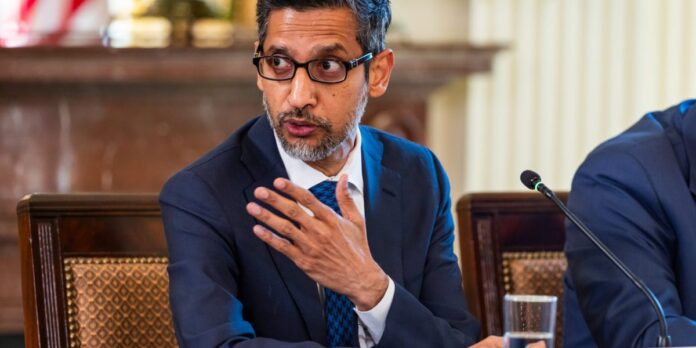Google CEO Sundar Pichai said AI may be gunning for his job, but he doesn’t seem too worried about it.
In an expansive interview with the BBC, the Google boss discussed the rapid development of technology. AI is advancing so swiftly, he said, that over the next 12 months the tech will be able to perform “complex” tasks and act as an agent on a users’ behalf.
“That’s where it gets really interesting,” he said.
AI may even be capable of replacing him at the helm of the $3.5 trillion tech behemoth, he added.
“I think what a CEO does is maybe one of the easier things maybe for an AI to do one day,” he said. Although he didn’t talk specifically about CEO functions that an AI could do better, Pichai noted the tech will eliminate some jobs but also “evolve and transition” others—ramifications that mean “people will need to adapt.”
Pichai’s comments come as other tech CEOs have also predicted the coming of a new era of chief executive automations. OpenAI CEO Sam Altman previously said AI will someday do his job better than him, adding, “I will be nothing but enthusiastic the day that happens.” Sebastian Siemiatkowski, CEO of buy-now-pay-later firm Klarna, also said in a post on X earlier this year that “AI is capable of doing all our jobs, my own included.”
The two CEOs join another 49% of 500 chief executives surveyed by online learning platform edX who believed “most” or “all” of their job functions should be automated by AI.
Meanwhile, some have taken the opposite stance. Nvidia CEO Jensen Huang, when asked last year about whether AI could take his job, replied “absolutely not.” He also said AI was a long way from replacing workers at a massive scale, adding that while the tech may be able to do some parts of a job up to 1,000 times better, “As we speak, AI has no possibility of doing what we do,” he added.
Apart from running a trillion dollar-plus company, Pichai claimed AI will also bring about revolutionary use cases more targeted to the average person.
“Down the line that means there are moments it can help you make a decision, like it could be, should I invest in this stock, ask the question,” he said. “Or my doctor is recommending a treatment, and how should I think about the pros and cons of that treatment.”
However, Pichai said there’s still time before the full capabilities of AI can come to fruition.
“There is still work to be done to unlock those capabilities, but that’s the journey which has been so exciting to see,” he said.


